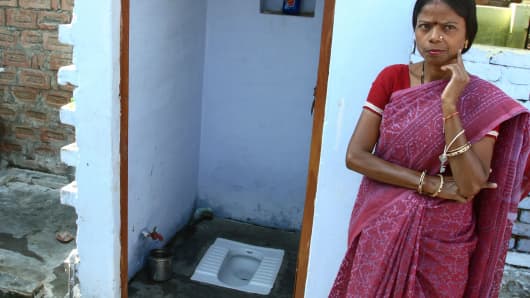
Like half a billion women and girls in India, two teenage cousins were forced to walk away from their homes in the Indian village of Katra in Uttar Pradesh to find a private place to defecate. It was during this time that the two girls were mercilessly attacked: raped and hanged from the mango trees that line the fields of their village.
Perhaps the lives of these two young girls could have been protected through access to a toilet at home. Few of India’s villages have proper sanitation, posing critical threats for women. Because of strict traditions of modesty, women are forced to seek relief in the dark, before dawn and after dusk, leaving them vulnerable to harassment.
Social entrepreneur Dr. Bindeshwar Pathak responded to the tragedy by offering to build a toilet for every home in the village. Since founding Sulabh International in 1970, Pathak has constructed toilets for 1.3 million households, servicing 15 million users daily.
Dedicated to Gandhian ideology on the emancipation of scavengers, Pathak aims to preserve the dignity of all users. His two-pit design works to collect and biodegrade waste into fertilizer and soil conditioner, eliminating the need for scavengers, a section of Indian society condemned to clean and carry human excreta. By building the structure 25 feet from the front door of each house, Pathak is able to create a safer, more private place for women and girls to find relief.
There are other sanitation solutions being brought to India, such as Caltech’s solar-powered toilet, which won the Bill & Melinda Gates Foundation’s Reinvent the Toilet Challenge. But construction of Caltech’s model would cost Indian communities $1,500 – for many, an unimaginable fortune.
The Sulabh toilet is affordable and easy to construct, made from locally available materials for approximately $250. Operation is manageable as flushing calls for 1.5 – 2 liters of water, opposed to the usual 12 – 14 liters required by commercial products. Pathak’s model is free from health hazards, such as the pollution of ground and surface water, foul smells, and mosquito, fly, and insect breeding, which spreads disease.
In many developing countries, neither the government nor local authorities can bear the cost of operation and maintenance of sewerage systems. Even when the money is spent, the sewerage systems pollute rivers and ponds, leading to the deterioration of groundwater aquifers and community health. Pathak knows that, in India, sewerage will not solve the problem of human waste management. Through the mission of Sulabh International, Pathak can develop India’s health and the safety for those, like the two cousins hanging from the mango trees in Katra who might have been saved.
For more reading on entrepreneurship in developing countries and organizations that support these efforts, visit PovertyCure.

